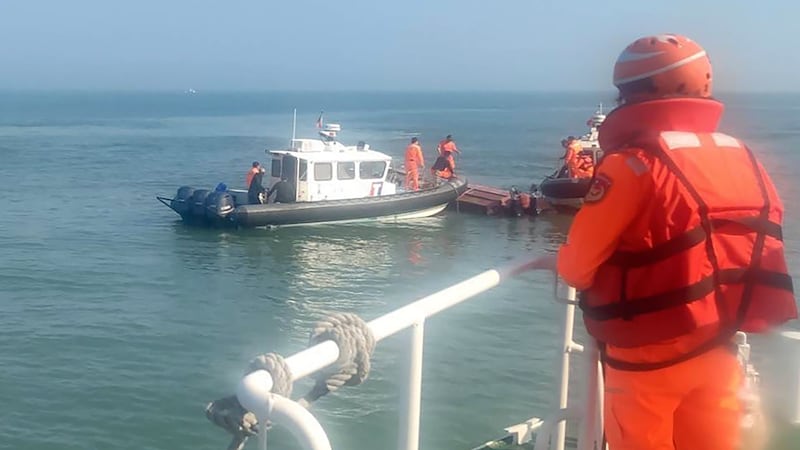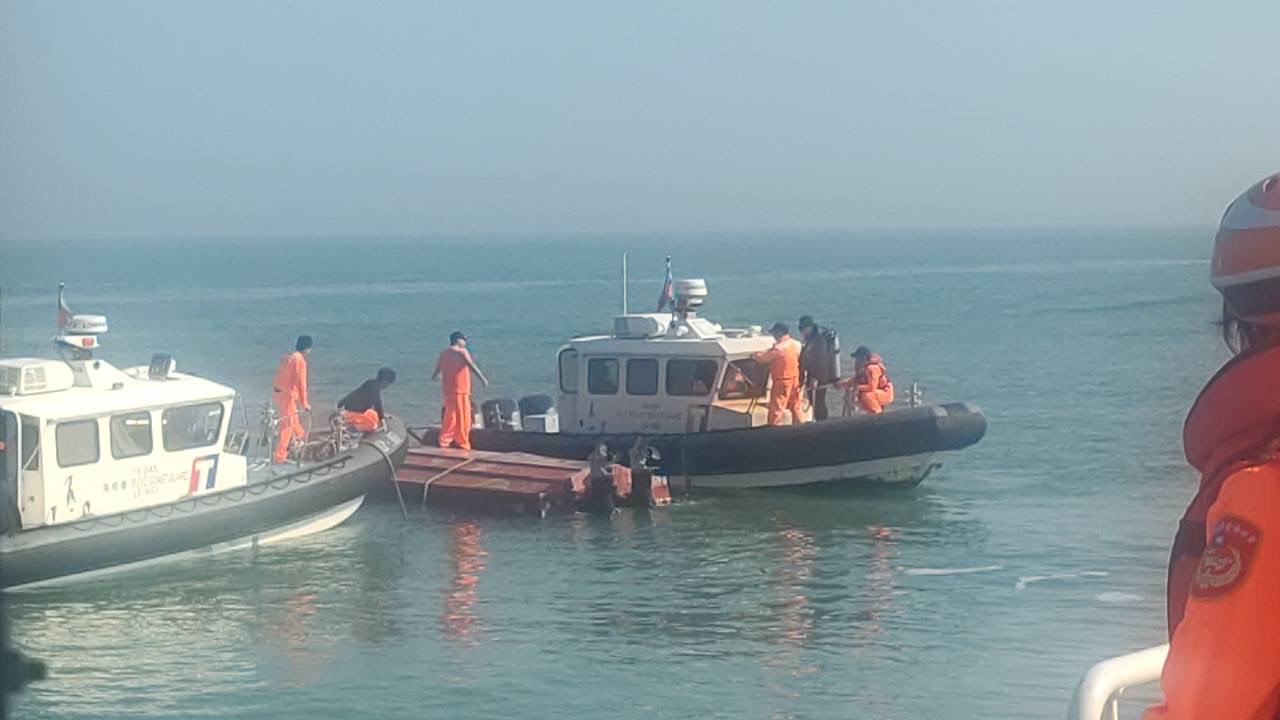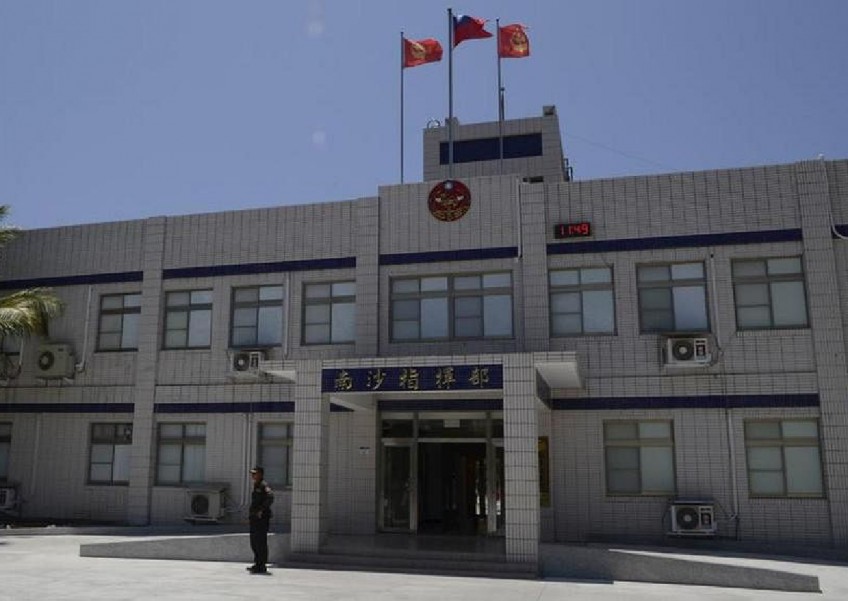Two Chinese fishermen drown after chase by Taiwanese coastguard
The incident happened near the Kinmen archipelago which lies between Taiwan and China.

The incident happened near the Kinmen archipelago which lies between Taiwan and China.

Taiwan coastguard Taiwanese coastguards inspect the vessel that capsized during a chase off the coast of Kinmen archipelago
(Taiwan Coast Guard Administration via AP)
By Huizhong Wu, Associated Press
February 15, 2024
Two Chinese fishermen have drowned while being chased by Taiwan’s coastguard off the coast of Taiwan’s Kinmen archipelago, the coastguard has said.
The deaths are unusual despite the level of Chinese activity in the waters near Kinmen, which is closer to China than it is to Taiwan’s main island.
China claims all of Taiwan as part of its territory.
China’s Taiwan affairs office strongly condemned the deaths and called for an investigation, saying “such a malicious event during the spring festival seriously hurts the feelings of compatriots on both sides of the Taiwan Strait”.
The statement accused the ruling Democratic Progressive Party in Taiwan of using “all sorts of excuses to forcefully inspect Chinese fishing vessels, and using violent and dangerous methods towards Chinese fishermen”.
The unnamed Chinese vessel had been sailing about one nautical mile off the coast of an islet of Kinmen island, Taiwan’s coastguard administration said in a statement.
The Chinese vessel attempted to flee but capsized.
Four fishermen fell into the water and two survived and are in “good shape”, while resuscitation efforts on the other two failed, the vice captain of the coastguard in Kinmen, Chen Jien-wen, told a local TV channel.
The coastguard said the case has been reported to the Kinmen prosecutor’s office, and the fishermen’s families were being contacted via official channels.
Taiwan’s head of the mainland affairs council, Chiu Tai-san, who oversees the island’s relations with China, told reporters on Thursday morning that “we keep a certain level of contact with the other side and our coastguard, and will promptly let them know of related developments”.
Kinmen is in the Taiwan Strait that separates China and Taiwan. From some parts of the archipelago, the southern Chinese city of Xiamen is visible to the naked eye.
Kinmen residents in recent years have reported seeing an increase in sand dredger vessels from China, which take sand from the ocean floor, as well as fishing ships, close to its coast.
At times, dozens of the ships can be seen from the island.
Two Chinese fishermen have drowned while being chased by Taiwan’s coastguard off the coast of Taiwan’s Kinmen archipelago, the coastguard has said.
The deaths are unusual despite the level of Chinese activity in the waters near Kinmen, which is closer to China than it is to Taiwan’s main island.
China claims all of Taiwan as part of its territory.
China’s Taiwan affairs office strongly condemned the deaths and called for an investigation, saying “such a malicious event during the spring festival seriously hurts the feelings of compatriots on both sides of the Taiwan Strait”.
The statement accused the ruling Democratic Progressive Party in Taiwan of using “all sorts of excuses to forcefully inspect Chinese fishing vessels, and using violent and dangerous methods towards Chinese fishermen”.
The unnamed Chinese vessel had been sailing about one nautical mile off the coast of an islet of Kinmen island, Taiwan’s coastguard administration said in a statement.
The Chinese vessel attempted to flee but capsized.
Four fishermen fell into the water and two survived and are in “good shape”, while resuscitation efforts on the other two failed, the vice captain of the coastguard in Kinmen, Chen Jien-wen, told a local TV channel.
The coastguard said the case has been reported to the Kinmen prosecutor’s office, and the fishermen’s families were being contacted via official channels.
Taiwan’s head of the mainland affairs council, Chiu Tai-san, who oversees the island’s relations with China, told reporters on Thursday morning that “we keep a certain level of contact with the other side and our coastguard, and will promptly let them know of related developments”.
Kinmen is in the Taiwan Strait that separates China and Taiwan. From some parts of the archipelago, the southern Chinese city of Xiamen is visible to the naked eye.
Kinmen residents in recent years have reported seeing an increase in sand dredger vessels from China, which take sand from the ocean floor, as well as fishing ships, close to its coast.
At times, dozens of the ships can be seen from the island.

Handout photo of Taiwanese authorities inspecting a Chinese fishing boat near Kinmen on Feb. 14, 2024.Taiwan Coast Guard Administration
BY CHAD DE GUZMAN AND KOH EWE
TIME
FEBRUARY 15, 2024
Two Chinese fishermen drowned off the coast of Kinmen, a group of islands that sit just six miles from mainland China, after being chased by Taiwanese maritime forces on Wednesday—marking what Taiwan’s Coast Guard Administration says is the first of its actions to have caused deaths. But China’s response to the tragedy, which some suggested could be used to escalate tensions already simmering around the island’s sovereignty, has been uncharacteristically restrained.
A Taiwanese coast guard statement Wednesday said the unnamed, mainland-China-registered boat had crossed a maritime border and failed to stop for inspection, instead speeding away from its patrol. The fishing boat capsized during the pursuit and four of its crew members fell into the sea, two of whom were rescued while the other two lost consciousness and died.
China was not happy. Zhu Fenglian, spokesperson for the Taiwan Affairs Office of the State Council in Beijing, condemned Taiwan for “such a vicious incident,” which also, China noted, happened during Lunar New Year celebrations. Zhu blamed Taiwan’s Democratic People’s Party—which is pro-independence and recently won another presidential term leading the island—alleging that its officials have long mistreated fishermen from the mainland and forcefully and dangerously seized mainland fishing boats, a pattern it claims led to the recent deaths.
“We warn the relevant parties in Taiwan to respect the historical fact that fishermen from both sides of the Taiwan Strait operate in the traditional fishing areas of the Taiwan Strait and ensure the personal safety of mainland fishermen, effectively preventing the recurrence of such incidents,” said Zhu.
FEBRUARY 15, 2024
Two Chinese fishermen drowned off the coast of Kinmen, a group of islands that sit just six miles from mainland China, after being chased by Taiwanese maritime forces on Wednesday—marking what Taiwan’s Coast Guard Administration says is the first of its actions to have caused deaths. But China’s response to the tragedy, which some suggested could be used to escalate tensions already simmering around the island’s sovereignty, has been uncharacteristically restrained.
A Taiwanese coast guard statement Wednesday said the unnamed, mainland-China-registered boat had crossed a maritime border and failed to stop for inspection, instead speeding away from its patrol. The fishing boat capsized during the pursuit and four of its crew members fell into the sea, two of whom were rescued while the other two lost consciousness and died.
China was not happy. Zhu Fenglian, spokesperson for the Taiwan Affairs Office of the State Council in Beijing, condemned Taiwan for “such a vicious incident,” which also, China noted, happened during Lunar New Year celebrations. Zhu blamed Taiwan’s Democratic People’s Party—which is pro-independence and recently won another presidential term leading the island—alleging that its officials have long mistreated fishermen from the mainland and forcefully and dangerously seized mainland fishing boats, a pattern it claims led to the recent deaths.
“We warn the relevant parties in Taiwan to respect the historical fact that fishermen from both sides of the Taiwan Strait operate in the traditional fishing areas of the Taiwan Strait and ensure the personal safety of mainland fishermen, effectively preventing the recurrence of such incidents,” said Zhu.
Taiwan’s coast guard said that fishing boats, such as the one in question this week, that have “no name, no ship certificate, and no ship registration” are “a common concern of cross-strait collaborative law enforcement,” Taiwan’s government-owned Central News Agency reported.
“We deeply regret that the mainland crew refused to cooperate with our law enforcement work and this unfortunate incident occurred,” Taiwan’s Mainland Affairs Council said in a statement on Thursday.
The deaths sparked outrage among the Chinese public. On Weibo, posts about the incident have garnered over 50 million views. In particular, some social media users are taking the chance to air nationalist sentiments, calling for retaliation against Taiwan, which Chinese authorities have long claimed—sometimes with threats of violence—as part of China.
“This is blatant provocation,” one Weibo user wrote, in a post that has garnered over 1,500 likes. “If it’s not possible to attack Taiwan now, it’s not difficult to severely punish Taiwan’s for its evil deeds, given our current strength.”
China’s official reaction, however, has been relatively “muted” considering the incident concerns Taiwan, Benjamin Ho, coordinator of the China Programme at the S. Rajaratnam School of International Studies in Singapore, tells TIME. And despite the clamor, he says, China is unlikely to escalate the matter.
Chin-Hao Huang, author of Power and Restraint in China’s Rise and associate professor of political science at the National University of Singapore, tells TIME that one reason why China’s response has been somewhat tempered may be due to a “tacit recognition” of the illegal actions of the fishing boat.
“In terms of legality, it is clear who’s in the wrong here—who actually trespassed and operated a vessel without the proper registration,” he says. “There’s an understanding and recognition too, from the Chinese side, that you can’t really press this case further because there’s no legal grounding for them to issue a tough and harsh statement.”
Ho also cautions that fishermen casualties would not rank high in China’s priorities. “It’s probably not going to rank as heavily as if a Chinese jet would be shot down, or even a drone,” he says.
Taiwan has a history of apprehending fishermen from the mainland entering its waters. In September 2023, the Taiwanese Coast Guard detained the crew of a fishing vessel spotted 16 nautical miles off Hua Islet, Taiwan’s westernmost islet. Fishing vessels and fishermen have historically been used by Chinese authorities as a way to solidify Beijing’s claims to disputed waters, especially in the South China Sea.
While the Taiwan Strait has long been home to political tensions, fatalities resulting from the ongoing territorial rows are virtually unheard of. A pair of deadly maritime disasters involving Taiwanese authorities and mainland Chinese fishermen made headlines in 1990, when a fishing boat repatriating 50 illegal Chinese immigrants back to the mainland was hit by a Taiwanese naval vessel at sea, killing 21 on board the boat; that came just weeks after 25 Chinese immigrants died of suffocation while being repatriated to mainland China, after Taiwanese authorities forced them into boat cabins that were then sealed shut.
Already strained relations between China and Taiwan were thrown into greater uncertainty after the DPP’s William Lai Ching-te won the presidency in Taiwan’s January election. While it remains too early to tell if Beijing will up its belligerence against the island it claims as its own, the level of restraint it has shown this week may offer a glimpse into a broader strategy going forward that may prioritize diplomacy over conflict.
Read More: Taiwan’s Election Isn’t Disastrous for China—Unless Xi Makes It
“In the grand scheme of things,” says Huang, “I think maybe, in Beijing’s calculations, this shouldn’t torpedo the larger effort China may have to … encourage Taiwan to return to more functional collaboration.”
Taiwan defends coast guard after China complains about fatal accident near front-line islet

Taiwan has complained in recent years about Chinese fishing boats and other vessels operating in Taiwan-controlled waters.
PHOTO: Reuters

Taiwan has complained in recent years about Chinese fishing boats and other vessels operating in Taiwan-controlled waters.
PHOTO: Reuters
FEBRUARY 15, 2024
TAIPEI - Taiwan on Feb 15 defended the actions of its coast guard after two people on a Chinese speedboat, which got too close to a front-line Taiwanese island, died when their boat overturned while trying to flee a coast guard ship.
China's Taiwan Affairs Office said Taiwan had for some time been treating Chinese fishermen in a "rough and dangerous" manner, which was the main reason for the "wicked" incident.
Taiwan, which China claims as its own territory, has complained in recent years about Chinese fishing boats and other vessels operating in Taiwan-controlled waters, especially around the Kinmen and Matsu islands that sit a short distance from China's coast.
On Feb 14, two out of four people on a Chinese speedboat that entered prohibited waters near Kinmen's Beiding islet, home to a military garrison, died when their boat overturned after it tried to flee from a Taiwanese coast guard vessel, the coast guard said.
Taiwan's Chinese-policy making Mainland Affairs Council said, according to a preliminary investigation, the coast guard performed their duties in accordance with the law and did nothing improper.
It is China that has failed to stop Chinese ships illegally dredging for sand, using explosives and poison to fish as well as dump garbage in Taiwanese waters, and the situation has not improved despite complaints, the council said.
"We deeply regret that the mainland crew members refused to co-operate with our law enforcement work this time and an unfortunate incident occurred.
"We also hope that the relevant mainland authorities can restrain similar behaviour by people on the other side" of the Taiwan Strait, it added in a statement.
Kinmen was the site of frequent fighting during the height of the Cold War and while many of the islets, which are part of the island group, are heavily fortified by Taiwan's military and off limits to civilians, today it is a popular tourist destination.
Taiwan, whose government rejects Beijing's sovereignty claims, says China has been using so-called grey-zone warfare, which entails using irregular tactics to exhaust a foe without actually resorting to open combat, including sending civilian ships into or close by Taiwanese waters.
TAIPEI - Taiwan on Feb 15 defended the actions of its coast guard after two people on a Chinese speedboat, which got too close to a front-line Taiwanese island, died when their boat overturned while trying to flee a coast guard ship.
China's Taiwan Affairs Office said Taiwan had for some time been treating Chinese fishermen in a "rough and dangerous" manner, which was the main reason for the "wicked" incident.
Taiwan, which China claims as its own territory, has complained in recent years about Chinese fishing boats and other vessels operating in Taiwan-controlled waters, especially around the Kinmen and Matsu islands that sit a short distance from China's coast.
On Feb 14, two out of four people on a Chinese speedboat that entered prohibited waters near Kinmen's Beiding islet, home to a military garrison, died when their boat overturned after it tried to flee from a Taiwanese coast guard vessel, the coast guard said.
Taiwan's Chinese-policy making Mainland Affairs Council said, according to a preliminary investigation, the coast guard performed their duties in accordance with the law and did nothing improper.
It is China that has failed to stop Chinese ships illegally dredging for sand, using explosives and poison to fish as well as dump garbage in Taiwanese waters, and the situation has not improved despite complaints, the council said.
"We deeply regret that the mainland crew members refused to co-operate with our law enforcement work this time and an unfortunate incident occurred.
"We also hope that the relevant mainland authorities can restrain similar behaviour by people on the other side" of the Taiwan Strait, it added in a statement.
Kinmen was the site of frequent fighting during the height of the Cold War and while many of the islets, which are part of the island group, are heavily fortified by Taiwan's military and off limits to civilians, today it is a popular tourist destination.
Taiwan, whose government rejects Beijing's sovereignty claims, says China has been using so-called grey-zone warfare, which entails using irregular tactics to exhaust a foe without actually resorting to open combat, including sending civilian ships into or close by Taiwanese waters.
No comments:
Post a Comment